Some Democrats seem to think that the very fact “inequality” even exists should be enough to lure the entire nation to the progressive cause. New York Times columnist Paul Krugman, in a recent piece imploring President Obama to emphasis on Social Justice in his State of the Union speech, argued as much, writing that “to focus on inequality is political realism. Like it or not, the simple fact is that Americans “get” inequality; macroeconomics, not so much.”
They may “get” it, but it’s probably a lot less powerful message than Krugman imagines.
There been a lot of talk about a new Pew Poll that finds 65 percent of Americans believe the divide between rich and poor is increasing over the years. Not surprisingly, 90 percent of Democrats believe government should do “a lot” or “some” to tighten the gap. Republicans (45 percent) believe the government should do something about inequality, while 23 percent say it should do a lot.
This last revelation is so awesome that Krugman punctuates it with an exclamation point. But really, why wouldn’t most people want to “do something” to diminish this appalling rise in “inequality” they’ve been hearing about on the news every day for years? How wide the disparity really is, and how much it really matters in alleviating poverty, I’ll leave to economists and the good citizens of the income-parity wonderlands of Laos and Bulgaria.
As with all things, wanting to “do something” will mean an array of contradictory policy measures. It is not, sorry to say, as easy as the false choice Pew ultimately offered in its poll: Do you want to raise taxes on the wealthy or do nothing? In fact, Pew might have done well to add another, more germane, question. Something along the lines of:
Which do you believe is a more effective way to reduce poverty: Implementing policies that further redistribute wealth and close the inequality gap or fostering policies that create more class mobility for Americans?
Because poverty is not “inequality.” Not even if President Barack Obama conflates the two, as he did recently when he argued that “a dangerous and growing inequality and lack of upward mobility” was the “defining challenge of our time.” Democrats tether inequality and mobility because they, no doubt, realize that one still matters more than the other. Without a zero-sum fallacy to rely on, explaining why inequality is so “dangerous” isn’t easy. And Americans don’t believe, as Obama seems to intimate, that the poor are stuck in their circumstance without government.
Now, as bad as Democrats think the fiendish plutocracy has gotten, and as big as Republicans believe the job-killing regulatory state has grown, Pew found that 60 percent of Americans continue to believe that opportunity exists for those who make the effort. Only 38 percent believe even with hard work and determination are no guarantee of success for most people. In other words, most of us still believe America is a meritocracy.
It’s certainly not blind idealism. Sixty percent of those polled by Pew also believe the economic system unfairly favors the wealthy. And I imagine there hasn’t been a day in human history where we didn’t assume the deck was stacked against us. And it is. So what? And as Kevin Williamson recently pointed out in NRO, it’s probably not as consequential as most people imagine:
For the top income quintile, gifts and inheritances amount to 13 percent of household wealth, according to research published by the Bureau of Labor Statistics. For the top wealth quintile, they amount to 16 percent. For the hated “1 percent,” inherited wealth accounts for about 15 percent of holdings. Contrary to the story the Left likes to tell about economic inequality in the United States, those numbers have gone down over recent decades — by almost half for the wealthiest Americans.
As it turns out, new data – data that Obama is unlikely to share with Americans – shows that little has changed over the past decades when it comes to mobility. The Equality of Opportunity Project’s new study by economists Raj Chetty and Emmanuel Saez found that, despite perceptions, social mobility in US is at the same level it was 30 years ago. Economists measured the ability of kids born in 1971 to 1993 to move into different income groups and found that a child born in 1971 in the bottom 20 percent of household earners had an 8.4 percent chance of ending up in the top 20 percent of earners by the time they hit their 30s. The chance of a child born in 1986 finding him/herself on the same trajectory was slightly higher, at 9.0 percent. The strongest predictor of upward mobility, it turns out, is one that conservatives have been touting for years: Getting married — not higher levels of “Social Justice”— is the key predictor for success.
Granted, that mobility number could be a lot better. And it seems that movement is more compartmentalized today than it used to be – as success breed success and vice versa. The report states that America is probably better described “as a collection of societies, some of which are ‘lands of opportunity’ with high rates of mobility across generations, and others in which few children escape poverty.” So treating “the poor” as one entity rather than making distinctions between working class families that have fallen on hard times, those stuck in the cultural continuum of poverty, and those who need society to bail them out of bad choices, might be good populist politics, but it’s lousy for policy.
Yet, in the political class’ arms race on empathetic political rhetoric (the State of the Union is sure to ratchet it up), it’s starting to sound like we don’t believe anyone in any of those groups can help themselves anymore. This is a perverted view of the American experience. It’s also false.









